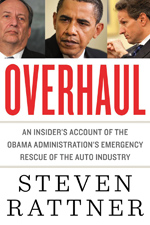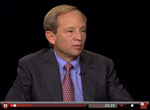The most remarkable aspect of last night’s Republican presidential debate was not Rick Perry’s inability to name the third cabinet department that he would eliminate nor the booing of Maria Bartiromo for raising Herman Cain’s sexual harassment issues. It was the cheering that greeted Newt Gingrich’s emphatic statement that his first act as President would be to fire Ben Bernanke, the chairman of the Federal Reserve, and the repeated insistence by all the hopefuls that they would not have engaged in any bailouts – not autos, not banks, not anything. Equally amazing was that this crowd reaction took place in Michigan, the state that has benefited more than any other from the decisions by both President George W. Bush and President Barack Obama to save the auto industry.
So let’s be clear: If the two Presidents, with the help of Ben Bernanke and the Federal Reserve, had not undertaken the menu of rescue operations that they pursued, we would quickly have had no financial system, no auto industry and in all likelihood, an economy that was barely functioning. It is the height of irresponsibility for Presidential candidates – or anyone else – to suggest that there was a viable alternative to the measures undertaken in 2008 and 2009. The Lehman bankruptcy – a step that the Republicans would no doubt applaud – set off a near panic that threatened the ability of the banking system to fund itself and conduct its normal operations. The actions by the Fed to provide liquidity to the system were not only entirely appropriate but essential. And without the $700 billion Troubled Asset Relief Program, which allowed Treasury Secretary Henry Paulson to shore up the financial system, we would have rapidly moved to a Depression Era scene of banks closing their doors, at least temporarily. Similarly, when General Motors and Chrysler appeared in Paulson’s office in October 2008, the Bush Administration faced only two choices: Provide financing from TARP or watch the two companies close their doors, stop manufacturing cars and lay off all their employees. Suppliers and service providers to the auto sector would have also been severely affected. The consequences would have been two to three million people put out of work in a matter of weeks and utter devastation across the Midwest, including in Rochester, Michigan, scene of last night’s debate.
To be absolutely clear, there was no possibility of a “managed bankruptcy” of auto companies, banks or anything else. In the fall of 2008 and spring of 2009, the stock market was in a free fall – as was the economy and jobs – and there was not a penny of private capital available to finance any of these entities in a “managed bankruptcy.” The only kind of bankruptcy that could have occurred would have been a liquidation. And if we feel that 9% unemployment is unacceptably high, imagine what it would have been if any of these critical components of our economic system were allowed to simply melt down.


